William Carey Biography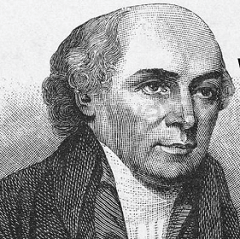
IntroductionWilliam Carey (17 August 1761 - 9 June 1834) was an English Christian missionary, particularly a Baptist clergyman, translator, social reformer, and cultural anthropologist who established Serampore College and Serampore institution, India's first degree-awarding institution. He came to modern-day Kolkata in 1793, but non-Baptist Christian missionaries compelled him to quit the British Indian dominion. He joined the Baptist missionaries at Frederiksnagar, Serampore's Danish colony. One of his first endeavors was constructing schools where impoverished children could learn to read, write, account for themselves, and practice Christianity. He founded Serampore's first theological college, conferring divinity degrees, and strove to eliminate sati. Carey is often regarded as the "Father of Modern Missions." The Baptist Missionary Society was founded due to his article, An Enquiry into the Obligations of Christians to Use Means for the Conversion of Heathens. The Asiatic Society praised Carey for "his eminent services in opening the stores of Indian literature to the knowledge of Europe, as well as his extensive acquaintance with this country's science, natural history, and botany, and his useful contributions, in every branch."William Carey has been described as a reformer and eminent Christian missionary. Early lifeWilliam Carey, the eldest of five children, was born in the hamlet of Pury End in the parish of Paulerspury, Northamptonshire, to weavers Edmund and Elizabeth Carey. William was reared in the Church of England; his father was appointed parish clerk and local schoolmaster when he was six. As a kid, he was curious and fascinated by the natural sciences, especially botany. He had a natural talent for language and taught himself Latin. 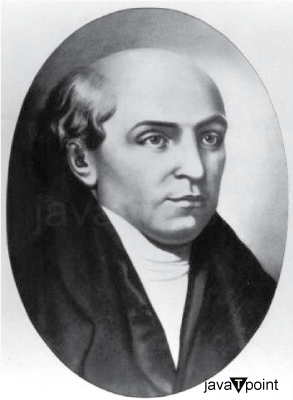
Carey moved to work for local shoemaker Thomas Old when Nichols died in 1779; in 1781, he married Old's sister-in-law Dorothy Plackett at the Church of St John the Baptist, Piddington. Dorothy was illiterate, unlike William; her signature on the marriage registration is a crude cross. William and Dorothy Carey had seven children, five boys, and two girls; both girls died while they were young, as did their son Peter, who died when he was five years old. Thomas Old died soon after, and Carey took over his firm. He learned Hebrew, Italian, Dutch, and French through reading constantly while working on the shoes. Carey recognized his low beginnings and identified himself as a cobbler. William Carey, the Shoemaker Who Became the Father and Founder of Modern Missions, was the title of John Brown Myers' biography of Carey. The Baptist Missionary SocietyCarey became active with a newly created local organization of Particular Baptists, where he met persons like John Ryland, John Sutcliff, and Andrew Fuller, who would become close friends in later years. Every other Sunday, they invited him to preach in their church in the adjacent community of Earls Barton. William Carey was baptized by Ryland on 5 October 1783 and joined the Baptist denomination. He was also invited to lead the local Baptist church. 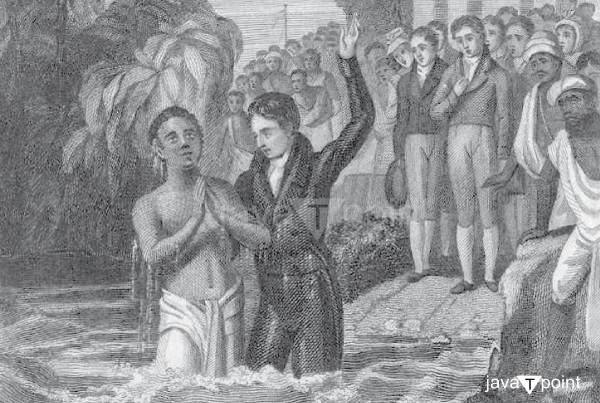
Carey was appointed full-time pastor of Harvey Lane Baptist Church in Leicester in 1789. Three years later, in 1792, he released An Enquiry into the Obligations of Christians to Use Means for the Conversion of Heathens, his core missionary credo. This little book is divided into five sections. The first section establishes the theological foundation for missionary effort, claiming that Jesus' commission to make disciples of all nations is still obligatory for Christians today. The second section follows the development of missionary efforts from the early Church to David Brainerd and John Wesley. The third section comprises 26 pages of tables that give every nation's area, population, and religion information. Carey had accumulated these statistics over his years as a teacher. The fourth section addresses concerns about sending missionaries, such as difficulties learning the language and danger to one's life. Finally, the fifth section argues for the foundation of a missionary organization by the Baptist denomination. It specifies the actual mechanisms by which it may be funded. Carey's key booklet describes his missionary philosophy: Christian responsibility, prudent use of available resources, and truthful information. Carey eventually overcame the opposition to missionary work. In October 1792, the Particular Baptist Society for the Propagation of the Gospel Amongst the Heathen was created, with Carey, Andrew Fuller, John Ryland, and John Sutcliff as foundation members. They next focused on practical things such as obtaining finances and determining where to focus their efforts. Dr John Thomas, a medical missionary from Calcutta, solicited finances in England; they decided to help him and that Carey would follow him to India. Missionary Life in IndiaIn April 1793, Carey, his eldest son Felix, Thomas, and his wife and daughter boarded a British ship from London. Dorothy Carey had refused to leave England since she was pregnant with their fourth boy and had never gone more than a few miles from home. Still, before they left, they persuaded her again, and she agreed, knowing that her sister Kitty would assist her in giving delivery. They were stopped en route in the Isle of Wight when the ship's captain received word that he would jeopardize his command if he transported the missionaries to Calcutta because their unlawful voyage violated the British East India Company's trade monopoly. They were delayed until June when Thomas found a Danish captain prepared to provide them passage. Meanwhile, Carey's wife, who had already given birth, agreed to follow him if her sister also arrived. In November, they arrived in Calcutta. 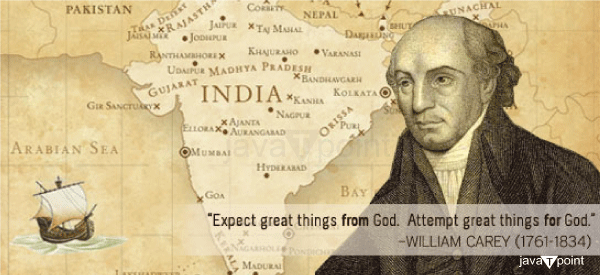
During their first year in Calcutta, the missionaries looked for a way to sustain themselves and a location to build their mission. They also started learning Bengali to converse with others. Carey relocated his family west to Midnapore because a friend of Thomas had two indigo mills and wanted supervisors. During the six years that Carey was in charge of the indigo plant, he finished the first revision of his Bengali New Testament. He began formulating principles that would guide his missionary community, such as communal living, financial self-sufficiency, and training indigenous ministers. Dorothy suffered a psychological collapse after his son Peter died of dysentery, which, coupled with other sources of stress, caused him to die. In the meanwhile, the missionary organization sent more missionaries to India. The first teacher to arrive in Midnapore was John Fountain. Following him were printer William Ward, educator Joshua Marshman, one of Marshman's students David Brunsdon, and William Grant, who died three weeks after his arrival. They moved to Serampore because the East India Company remained hostile to missionaries. Carey arrived at this Danish colony on January 10, 1800. Late Indian PeriodOnce in Serampore, the mission purchased a home large enough to house all of their families and a school, which would serve as their primary source of support. Ward established a print business using a used press Carey had obtained and began printing the Bengali Bible. Fountain died of dysentery in August 1800. At the end of that year, the mission had its first conversion, a Hindu called Krishna Pal. They also had the support of the local Danish authority and Richard Wellesley, the then-Governor-General of India. Converting Hindus to Christianity raised a new issue for missionaries: whether it was proper for converts to keep their caste. In 1802, Krishna Pal's Sudra daughter married a Brahmin. This wedding publicly displayed the church's rejection of caste differences. Brunsdon and Thomas died in 1801. The next year, the Governor-General built Fort William College to train government officers. He proposed to Carey the position of Bengali professor. Carey's undergraduate classmates included commentators with whom he might consult to correct his Bengali evidence. One of his colleagues, Madan Mohan Tarkalankar, taught him Sanskrit. He also wrote a grammar for Bengali and Sanskrit and began translating the Bible into Sanskrit. He used his influence with the Governor-General to assist in eliminating infant sacrifice and suttee after consulting with pundits and determining that the rites had no foundation in Hindu sacred writings. Dorothy Carey passed away in 1807. She had long ago ceased to be an able part of the mission due to her terrible mental collapse, and her condition was an added hardship. Dorothy was committed to a mental hospital after many friends and coworkers convinced William to do so. But he trembled at the prospect of her being treated in such a hospital. Even though the children were subjected to her rages, he assumed responsibility for keeping her in the family home. In 1808 Carey remarried. Charlotte Rhumohr, a Danish church member and Carey's second wife, was an intellectual equal to Dorothy. They had been married for 13 years when she died. The mission's printing press produced Bible translations in Bengali, Sanskrit, and other significant languages and dialects. Thus, William Ward had to hand-make punches for the type. Carey had begun translating literary and spiritual works from Sanskrit into English to make them available to his people. A fire in the print business on March 11, 1812, cost �10,000 in damages and missed work. Many priceless manuscripts were lost, including much of Carey's translation of Sanskrit literature and a polyglot dictionary of Sanskrit and kindred languages, which would have been a critical work in philology if finished. The press and punches, however, were salvaged, and the mission could restart printing in six months. In addition, on his route to India in 1812, Adoniram Judson, an American Congregational missionary, read the baptismal scriptures in preparation for a meeting with Carey. His studies led to his conversion to the Baptist faith. Carey's entreaties to American Baptists to assume support for Judson's mission resulted in the formation of the first American Baptist Mission board, the General Missionary Convention of the Baptist Denomination in the United States of America for Foreign Missions, in 1814, later known as the Triennial Convention. This meeting gave birth to the majority of present American Baptist denominations, either directly or indirectly. Serampore College was formed in 1818 to prepare indigenous pastors for the developing church and give education in the arts and sciences to anybody, regardless of caste or nation. In 1827, Frederick VI, King of Denmark, handed the college a royal charter, making it the first degree-granting school in Asia. Carey created the Agri Horticultural Society of India in Alipore, Calcutta, in 1820 to foster his interest in botany. When William Roxburgh went on leave, Carey was entrusted with the upkeep of the Calcutta Botanical Garden. After him, the genus Careya was named. As the Missionary Society grew, senior missionaries died and were replaced by less experienced men, causing internal strife and discontent. Some new missionaries arrived who were hesitant to live communally, with one even wanting "a separate house, stable, and servants." Unaccustomed to Carey, Ward, and Marshman's severe work ethic, the new missionaries considered their superiors, particularly Marshman, tyrants who assigned them assignments they didn't enjoy. Andrew Fuller, the Society's secretary in England, died in 1815. His replacement, John Dyer, was a bureaucrat who wanted to reorganize the Society along commercial lines and supervise every element of the Serampore mission from England. Their disagreements became intractable, and Carey publicly cut connections with the missionary organization he had formed, abandoning the mission site and relocating to the college grounds. He led a tranquil life until he died in 1834, editing his Bengali Bible, preaching, and educating pupils. The sofa on which he died on June 9, 1834, is today preserved at Regent's Park College, the University of Oxford's Baptist College. Life in IndiaMuch of what we know about Carey's efforts in India comes from missionary reports sent back to the United States. Historians such as Comaroffs, Thorne, Van der Veer, and Brian Pennington point out that the portrayal of India in these accounts must be seen in context and with consideration for evangelical and colonial ideology. His history, personal issues, and religious convictions influenced Carey's reports. Carey and his collaborator William Ward were in a population suffering from terrible poverty and diseases, and they built a vision of Indian culture and Hinduism in light of their missionary ambitions. These reports were written by persons who had professed their commitment to overseas missionary activity, and the letters reflect the experiences of foreigners who were reviled by both the Indian public and European officials as well as rival Christian groups. Their descriptions of culture and Hinduism were created in Bengal, where preaching was physically, politically, and spiritually challenging. Carey advised his fellow Anglo-Indians to study and interpret Sanskrit in a "compatible with colonial aims," stating that "to gain the ear of those who are thus deceived, they must believe that the speaker has a superior knowledge of the subject." Knowledge of Sanskrit is helpful in these cases." Carey lacked comprehension and regard for Indian culture, according to Indian historian V. Rao, characterizing Indian music as "disgusting" and calling to mind behaviors "dishonorable" to God. Such attitudes influenced Carey and his colleagues' literature. FamilyMany biographies of Carey only refer to his sorrow due to his wife, Dorothy's, mental illness, and subsequent collapse in the early years of their ministry in India. More recently, Beck's biography of Dorothy Carey provides a more thorough picture: William Carey uprooted his family from everything they knew and attempted to establish them in one of the world's most unexpected and hardest societies for an ignorant eighteenth-century British working-class lady. Faced with significant challenges in adjusting to this upheaval, she failed to make the emotional and, eventually, mental adjustment. Her husband could not support her through it all because he did not know what to do. On 5 October 1795, Carey wrote to his sisters in England, "I have been in danger of losing my life for some time. The great evil that haunts her mind is jealousy." EschatologyAside from Iain Murray's work, The Puritan Hope, little attention has been paid to Carey's postmillennial eschatological as articulated in his main missionary manifesto in his various biographies, not even in Bruce J. Nichols' article "The Theology of William Carey." Even the two dissertations that examine his achievements (by Oussoren and Potts) should devote more attention to significant areas of his theology. Neither acknowledges his eschatological ideas, which were crucial to his missionary zeal. One example is James Beck's biography of his first wife, which mentions his optimism in the chapter on "Attitudes Towards the Future," but not his hopeful attitude on world missions, which he gained from postmillennial theology. Translation, Education & SchoolsCarey committed significant time and effort to learning the common language of Bengali and many other Indian vernaculars, including the ancient root language of Sanskrit. Carey began translating Hindu classics into English with the College of Fort William, beginning with the three-volume epic poem the Ramayana. The Bible was then translated into Bengali, Oriya, Marathi, Hindi, Assamese, and Sanskrit, as well as sections of it into other dialects and languages. Carey taught Bengali, Sanskrit, and Marathi at the institution for 30 years, releasing the first book on Marathi grammar in 1805. 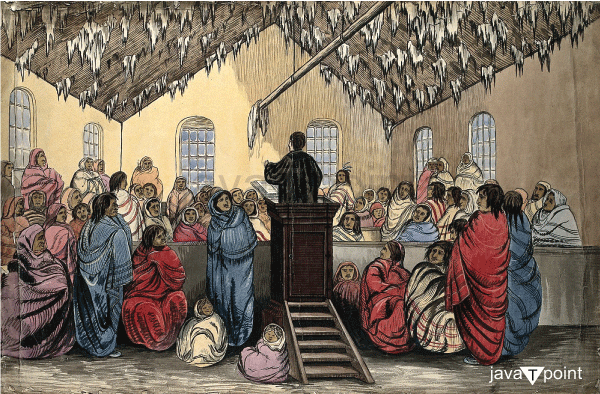
Carey is credited with founding Serampore Mission Press, which "consistently thought it important enough that costly type fonts be cast for the irregular and neglected languages of the Indian people." Carey and his collaborators wrote textbooks, dictionaries, ancient literature, and other publications for elementary school students, college students, and the general public. These featured the first comprehensive Sanskrit grammar, a paradigm for subsequent publications. Only children from particular socioeconomic strata in India got an education in the late 1700s and early 1800s, and even then, it was confined to rudimentary bookkeeping and the Hindu religion. Only the Brahmins and writing castes could read, and then only men, because women were utterly illiterate. Carey established Sunday Schools where children learned to read using the Bible as a textbook. Carey established the first elementary school in India in 1794 at his own expense. Carey's public school system extended to include girls at a time when female education was thought inconceivable. Carey's effort is regarded as the seed that grew into the Christian Vernacular Education Society, which provides English medium education across India. InfluenceWilliam Carey served in India for 41 years without a leave of absence. In a nation of millions, his ministry had just 700 converts. Still, he had established a fantastic foundation of Bible translations, education, and social reform. He was dubbed the "Father of Modern Missions" and "India's First Cultural Anthropologist." 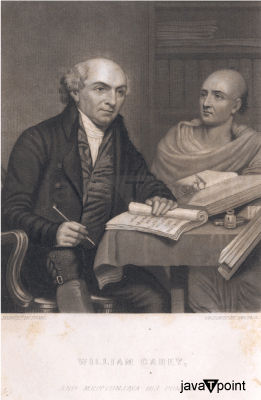
His educational institutes, teaching, translations, writings, and publications, as well as his impact on social change, are claimed to have "marked the turning point of Indian culture from a downward to an upward trend." Carey regarded India as his heavenly Father's territory to be loved and redeemed, not as a foreign nation to be exploited... he believed in understanding and managing nature rather than fearing, appeasing, or worshipping it; in growing one's intellect rather than murdering it, as mysticism taught. He stressed loving literature and culture rather than dismissing it like Maya did. Carey was influential in the establishment of Serampore College at Serampore. The Baptist Missionary Society was founded due to Carey's fervently emphasizing reform. William Carey Christian School (WCCS) in Sydney, NSW, is one of at least eleven schools named after him. William Carey International University was established in Pasadena, California, in 1876. Carey Baptist College in Auckland, New Zealand; Carey Baptist Grammar School in Melbourne, Victoria; Carey College in Colombo, Sri Lanka; and William Carey University, founded in Hattiesburg, Mississippi, in 1892. Also in Perth, Australia, is Carey Baptist College. The William Carey Academy in Chittagong, Bangladesh, educates pupils from kindergarten through grade 12. At the same time, the William Carey Memorial School is located in Serampore, Hooghly. On August 17, 2008, William Carey International School, an English medium school, opened in Dhaka, Bangladesh. ArtifactsA William Carey exhibit may be seen in St James Church in Paulerspury, Northamptonshire, where Carey was baptized and attended as a youngster. Carey Baptist Church in Moulton, Northamptonshire, also features a collection of memorabilia relating to William Carey and his neighboring cottage. 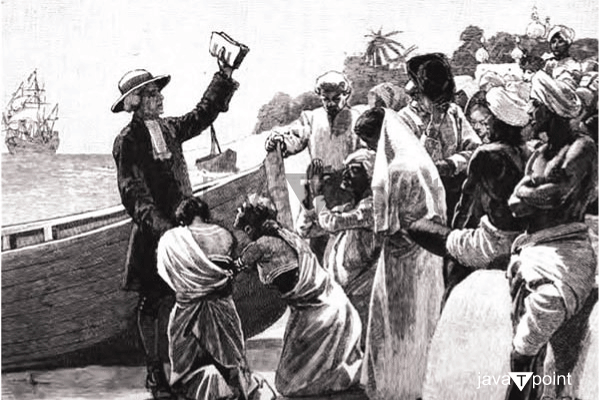
Carey's final church in England before going to India, Harvey Lane Baptist Church in Leicester, was destroyed by fire in 1921. From 1915 to 1968, Carey's neighboring home functioned as a 'Memories of Carey' museum before being demolished for a new road system. The exhibits from the museum were given to the William Carey Museum at Central Baptist Church on Charles Street in Leicester. The Angus Library and Archive at Oxford has the most comprehensive single collection of Carey letters and several items from his cordwainer shop, such as his Bible. The Center for Study of the Life and Work of William Carey in Donnell Hall on the William Carey University Hattiesburg campus houses a vast collection of historical relics, including letters, books, and other objects that belonged to Carey. Missions TodayCarey Street (Anstey Road) in downtown Reading is home to the church adjacent to the Inner Distribution Road (IDR), Oxford Road, and The Hexagon. On Sundays, the major service times are 10:30 and 18:00. The sermons are accessible in MP3 format on the church's website, and Sunday services are webcast live. 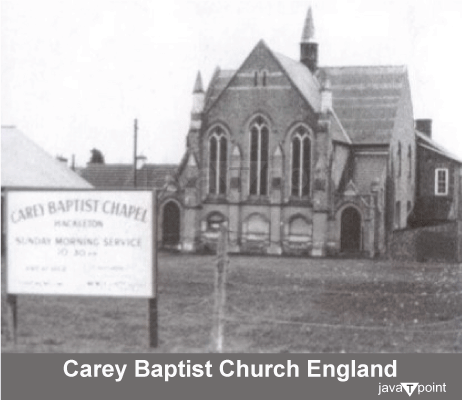
The church is a member of Affinity and the Fellowship of Independent Evangelical Churches (FIEC). James Muldoon and David Magowan are the current pastors. Jonathan Stephen departed the church on July 16, 2006, to become principal of the Wales Evangelical School of Theology, and Basil Howlett retired as co-pastor in January 2009. In the legacy of William Carey, the church continues to send missionaries to India and the Amazon. David Barnes, a Carey missionary, worked in Aysana, a little community approximately five hours downstream from Iquitos, Peru, in 2005. Ian Stillman, a deaf missionary sent to India by Carey Baptist, was arrested and accused of smuggling 20 kg of cannabis when discovered in a shared cab in August 2000. It is commonly assumed that the allegations were made up. Parliament paid "pa(id) tribute" to Carey Baptist for his successful effort to free Stillman.
Next TopicZulfikar Ghose
|
 For Videos Join Our Youtube Channel: Join Now
For Videos Join Our Youtube Channel: Join Now
Feedback
- Send your Feedback to [email protected]
Help Others, Please Share









